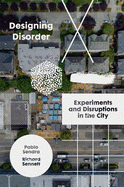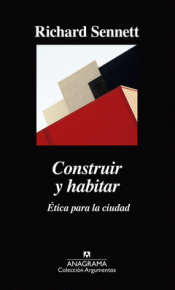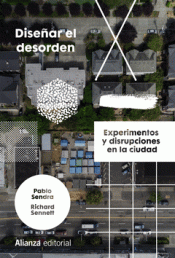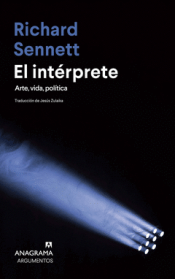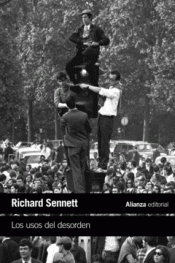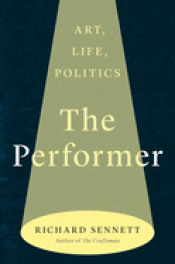A manifesto for the Open City: vibrant, disordered, adaptable.
In 1970 Richard Sennett published the ground breaking The Uses of Disorder, that the ideal of a planned and ordered city was flawed, likely to produce a fragile, restrictive urban environment. Fifty years later, Sennett returns to these still fertile ideas and alongside campaigner and architect, Pablo Sendra, sets out an agenda for the design and ethics of the Open City.
The public spaces of our cities are under siege from planners, privatisation and increased surveillance. Our streets are becoming ever more lifeless and ordered. What is to be done? Can disorder be designed? Is it possible to maintain the public realm as a flexible space that adapts over time? In this provocative essay Sendra and Sennett propose a reorganisation of how we think and plan the social life of our cities. What the authors call 'Infrastructures of disorder' combine architecture, politics, urban planning and activism in order to develop places that nurture rather than stifle, bring together rather than divide up, remain open to change rather than closed off.
The book proves that ideas of disorder are still some of the most radical and transformative in debates on 21st century cities.
"In this very readable essay, Sennett pushes on the ideas he developed in his 'Uses of Disorder'. The upshot seems to be the 'open city'; the antithesis of places like New York's Hudson Yards; a pre-determined, real-estate driven 'community' that can only degrade over time. Given contingent times, a necessary critical view of the modern urban realm."
--RIBA Journal
"The promotion of this sense of impotence, and the resulting inertia, are encouraged by a patronising capitalist 'nanny state' on behalf of corporations for whom profits, not people, matter. The only antidote to that inertia is surely to start planning the 'disorder' promulgated by Sendra and Sennett."
--Morning Star
Pablo Sendra is Lecturer in Planning and Urban Design at The Bartlett School of Planning, University College London. He is also co-founder and partner of the urban design practice Lugadero and co-founder of the network CivicWise. He develops action research projects and radical teaching in collaboration with community groups and activists in London. He is co-author (with Daniel Fitzpatrick) of Community-Led Regeneration (2020) and co-editor (with Maria João Pita and Civicwise) of Civic Practices (2017).
Richard Sennett's first book was The Uses of Disorder, in 1970. His previous books include The Fall of Public Man, Flesh and Stone and Respect, as well as the recent Homo Faber trilogy, The Craftsman, Together, Building and Dwelling. For decades he has advised urban programmes for the United Nations, and has also worked as a planner for poor communities. He now teaches urban studies at the London School of Economics and at Harvard University. He has been awarded the Hegel and Spinoza prizes, as well as an honorary doctorate by Cambridge University.
DESIGNING DISORDER
AUTOR/A
SENNETT, RICHARD
Sennett Richard. Nacido en Chicago en 1943, graduado de las Universidades de Chicago y Harvard ?en esta última obtiene su Doctorado ?, Richard Sennett es quizás uno de los principales exponentes de la vida académica americana contemporánea.<BR>Profesor de la London School of Economics (LSE) y Profesor de Humanidades de la New York University, Sennett ha hecho una llamativa carrera a partir de la exploración de los intersticios existentes entre la sociología académica, la historia intelectual de la moda y la crítica social.<BR><BR>Conocido por sus estudios sobre los lazos sociales en las ciudades y los efectos que la vida urbana tiene en los individuos en el mundo moderno.<BR>Casado con la socióloga y economista Saskia Sassen.<BR>Ha sido galardonado con los premios Amalfi y Ebert de Sociología y recientemente ?en 2006 ? ha sido distinguido en Alemania con el Premio Hegel.. Es miembro de la Academia Americana de Artes y Ciencias, la Sociedad Real de Literatura, la Sociedad Real de las Artes y la Academia Europea. Ha sido miembro también del Centro de Estudios Avanzados en Ciencias del Comportamiento y Presidente del Concejo Americano de Trabajo. Es el fundador del Instituto de Humanidades de Nueva York, que ha reunido a notables figuras ?como Susan Sontag, Thomas Kuhn, Joseph Brodsky y Michel Foucault.<BR><BR>Entre sus obras más destacadas se encuentran:<BR>- La cultura del nuevo capitalismo. Barcelona: Editorial Anagrama. 2006<BR>- El respeto. Sobre la dignidad del hombre en un mundo de desigualdad. Barcelona: Editorial Anagrama. 2003<BR>- El declive del hombre público. Barcelona: Península. 2002<BR>- Vida urbana e identidad personal. Barcelona: Ediciones Península. 2001<BR>- La corrosión del carácter. Las consecuencias personales del trabajo en el nuevo capitalismo. Barcelona: Editorial Anagrama. 2006 (Primera edición: 1999)<BR>- Carne y piedra. El cuerpo y la ciudad en la civilización occidental. Madrid: Alianza. 1997<BR>- Autoridad. London: Faber & Faber. 1993<BR>- La conciencia del ojo. Barcelona: Ediciones Versal. 1992<BR>- Narcisismo y cultura moderna. Barcelona: Kairos. 1980
SENDRA, PABLO
Pablo Sendra es profesor de Planificación y Diseño Urbano en la Bartlett School of Planning del University College of London, y combina su carrera académica con la práctica profesional del diseño urbano. Es cofundador del estudio de diseño urbano Lugadero y de la red Civicwise. Junto con Daniel Fitzpatrick, es autor del libro "Community-Led Regeneration", además de haber coeditado (junto a Maria João Pita y CivicWise) el volumen "Civic Practices". Es parte del City Collective de la revista City. A través de su investigación y su docencia, colabora con comunidades y grupos de activistas en proyectos de investigación-acción.

